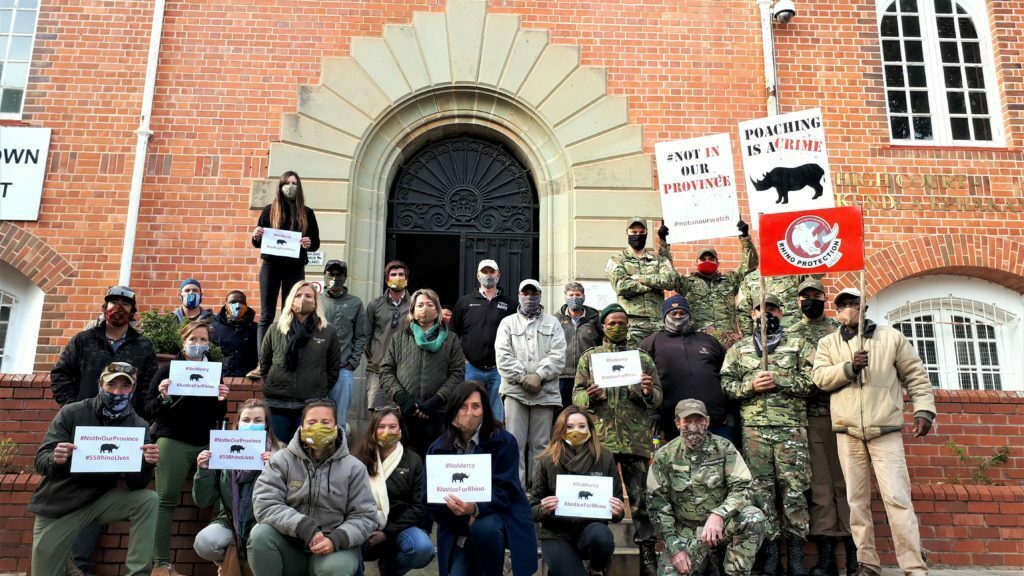Wildlife veterinarian Dr William Fowlds says poaching statistics have dropped substantially in the Eastern Cape, thanks to effective law enforcement. But ahead of the appeal bid by convicted rhino poachers the Ndlovus in the High Court in Makhanda this week, he was worried.
“When poachers have money… they’re able to appeal these cases and just take just take them higher and higher up the judicial system until they succeed and get away with it,” Fowlds said.
Jabulani Ndlovu, Forget Ndlovu and Sibusiso Ndlovu were sentenced to an effective 25 years imprisonment each in April 2019 on 55 counts for rhino-poaching incidents over a period of three years. The investigations were widely praised as groundbreaking and thorough. They included extraordinary detail such as finding a yellow paint chip the size of a fingernail at the Bucklands Reserve poaching scene and matching it with the gap on the yellow saw the men had with them when they were arrested. In a first, ballistic testing was done on a dart gun.
The judgment handed down by Justice Jeremy Pickering on Friday 15 March referred to 10 rhino poaching incidents around Makhanda as well as in Jansenville, Graaff Reinet and Cradock During the Ndlovus’ three-year poaching spree, between 2013 and 2016, at least 10 rhinos died and 17 rhino horns were removed. Jabulani and Sibusiso were convicted and sentenced for all 10 incidents, Forget, for nine.
In July last year, the Supreme Court granted the men leave to appeal their conviction and sentence. Their October 2019 bid for bail on this basis was denied, however.
They were arrested at Makana Resort on the night of 17 June 2016, in a long-running investigation dubbed Operation Full Moon. Bucklands Reserve rhino Campbell was later discovered dead in a pool of blood, his horn removed.
The men’s unexpected decision to stay over in Grahamstown that night, rather than return to Port Elizabeth, led to a series of events that forced investigators to rapidly adapt their plans. During the trial, Advocate Terry Price SC was at pains to point out the gaps in standard police procedure that resulted.
During this week’s appeal, it was these gaps that Price brutally tore into as he sought to put the bona fides of the SAPS Endangered Species Unit’s actions that night into question. This included their failure to obtain a search warrant before entering the chalet at Makana Resort, and lead investigator Captain Morne Viljoen’s neglecting to fill in his police notebook at the time that events unfolded.
Price described the men’s conviction and sentencing on the basis of the “maliciously unlawful” search was a “trampling of the Constitution”.
In his judgment, Justice Pickering had indeed ruled that the search was unlawful, but not the evidence obtained in that search. This included the saw matched to the paint chip found at the scene of the Bucklands incident, dart guns, tranquillisers, cellphones and the bloodied horn itself – DNA-matched to Campbell. He ruled that while there were gaps in standard police procedure, the operation had been in good faith.
Price argued in this week’s appeal that it was wrong to admit this evidence because it had been unlawfully obtained (i.e. without first securing a search warrant). His argued that the police had not acted in good faith.
State Prosecutor Buks Coetzee in his heads of argument opposing the appeal said the case for their conviction could have stood on the evidence of the men’s movements, including cellphone records, car-hire documents and visitor registers. Through these records, various poaching incidents were meticulously linked with the timing of the men’s visits to specific locations.
“Even sans the latter evidence (if ruled inadmissible), the remaining body of evidence is sufficient to support the convictions,” Coetzee told the full bench of judges – David Viljoen, Judith Roberson and Rob Griffiths. “The circumstantial evidence established without doubt the links.”
He also pointed out that the evidence hadn’t relied on the cellphone handsets themselves, but rather the numbers.
Arguing for the retention of their sentence, Coetzee said the Ndlovus had shown no remorse, nor shared any information with the court that would assist in preventing further poaching incidents.
“At the start of their trial they said they would admit the theft of the rhino horn, but they were not prepared to explain,” Coetzee said. “There is nothing in mitigation. They were motivated entirely by greed and financial gain.”
The appeal was heard in Civil A in the Grahamstown High Court. The Ndlovus were not present. Judgment was reserved, which means it may be anything between two weeks and two months before the decision is handed down.
Around 50 staff from surrounding reserves, including Amakhala, Lalibela, Buffalo Kloof and Shamwari, as well as Vetpaw volunteers, protested outside the court’s entrance ahead of the appeal hearing. With them was Fowlds.
“In this province we have taken a no tolerance approach to rhino poaching,” Fowlds told Grocott’s Mail. “Our slogan #NotInOurProvince is something we are trying to uphold in this community. We all know that in this country, our law-enforcement has been the weakest link in our fight to stop rhino poaching.
“But that has not been the case in the Eastern Cape. The judicial system here has shown that if you stand together and work as a team, you are able to not only arrest poachers, but get through to successful convictions.”
Rhino poaching statistics in the Eastern Cape had dropped substantially, thanks to these successes in the courts.
“What we’re fearful of today is that when poachers have money, like clearly this gang has, they’re able to appeal these cases and just take them higher and higher up the judicial system until they succeed and get away with it,” said Fowlds.
https://www.grocotts.co.za/2019/04/03/tears-cheers-as-ndlovu-gang-gets-25-years/


